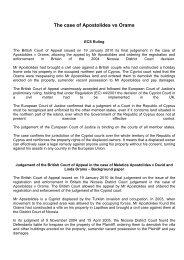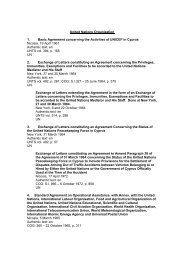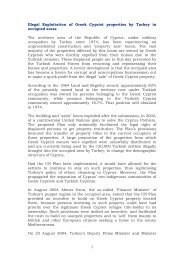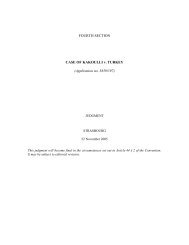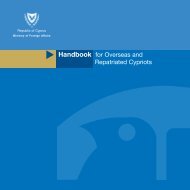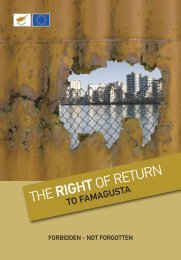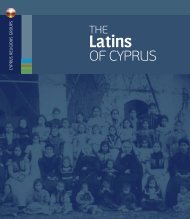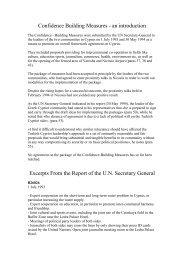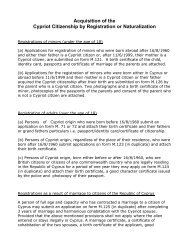Myra Xenides- Arestis v. Turkey
Myra Xenides- Arestis v. Turkey
Myra Xenides- Arestis v. Turkey
Create successful ePaper yourself
Turn your PDF publications into a flip-book with our unique Google optimized e-Paper software.
XENIDES-ARESTIS v. TURKEY DECISION 13Thus, the respondent Government conclude that the Annan Plan reflectsan acknowledgment that <strong>Turkey</strong> does not have “jurisdiction” in northernCyprus and consequently, that the pending cases cannot be regarded asfalling within the terms of Article 1 of the Convention. They stress thatacceptance of the view that northern Cyprus does not fall within theConventional jurisdiction of <strong>Turkey</strong> would not lead to internationalrecognition of the “TRNC”, since such recognition could only stem frompositive action by states, individually or collectively. Furthermore, in theirview, such an approach would not create a vacuum in the system of humanrights protection, the possibility of which evidently concerned the Court inCyprus v. <strong>Turkey</strong> (op. cit.). This is evident from the establishment of aneffective remedial framework under “TRNC” law coupled with otherdevelopments affirming the responsibility of the “TRNC” for these issues asopposed to <strong>Turkey</strong> and the recognition and application of the Convention inthe territory of northern Cyprus that will be relevant to the operation of theCommission.Alternatively, the respondent Government contend that if the Court wereto conclude that northern Cyprus remains subject to the jurisdiction of<strong>Turkey</strong> and that cases like the instant one are admissible, it will have toaddress the merits of each case. In such circumstances, they note that theCourt should bear in mind that the property settlement proposed in theAnnan Plan constituted the considered view of the UN Secretary-General,endorsed by the international community, that the reciprocal arrangementsset out therein for the settlement of outstanding property claims would be afair and reasonable resolution of that aspect of the dispute as part of anoverall settlement.(b) The applicantThe applicant disputes the submissions of the respondent Governmentrelying essentially on the reasons given by the Court for rejecting similarobjections raised by <strong>Turkey</strong> in its judgments in Loizidou v. <strong>Turkey</strong>(preliminary objections and merits, op. cit.) and Cyprus v. <strong>Turkey</strong> (op. cit.)and the conclusions of the European Commission on Human Rights in itsreport of 4 June 1999 (reported in Cyprus v. <strong>Turkey</strong>, [GC], no. 25781/94,ECHR 2001-IV). She emphasises that there has not been any materialchange of facts since the adoption of the above judgments and that <strong>Turkey</strong>continues to exercise effective control over the northern part of Cyprus.Furthermore, she points out that in accordance with the report of the UNSecretary-General, the respondent Government are responsible for the statusquo in the fenced-up area of Varosha (Famagusta) where the applicant'shome and property are situated.The applicant submits that the Annan Plan as such, whether or not inforce, as a matter of general principle can have no effect on the powers andresponsibilities of the Court, the application of the Convention or the Rules





